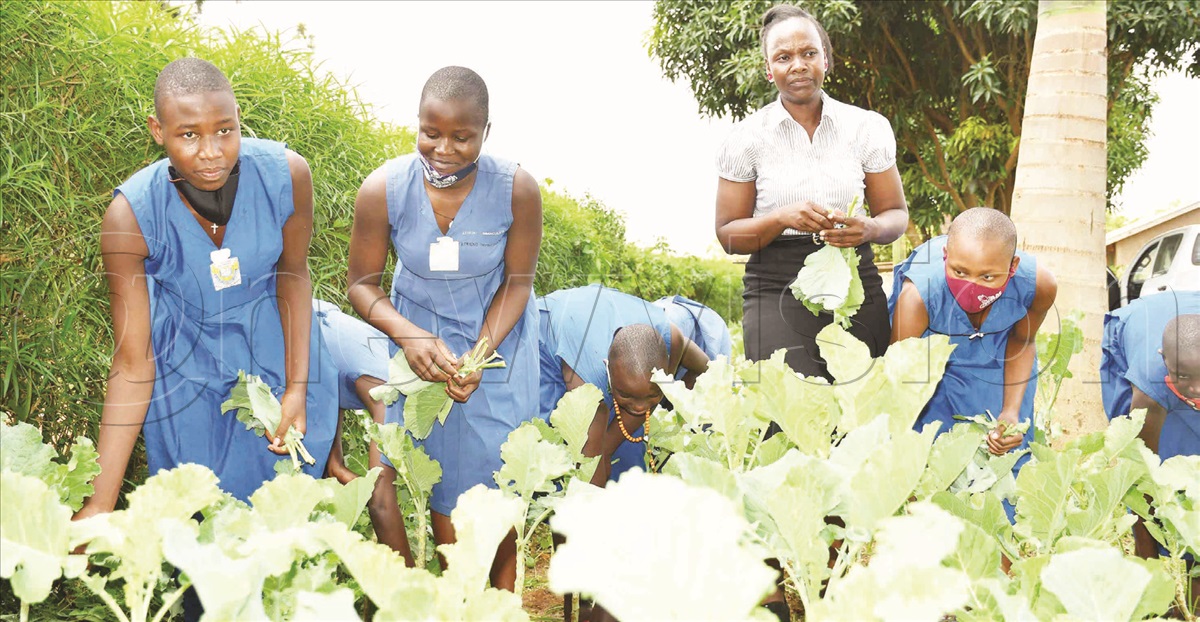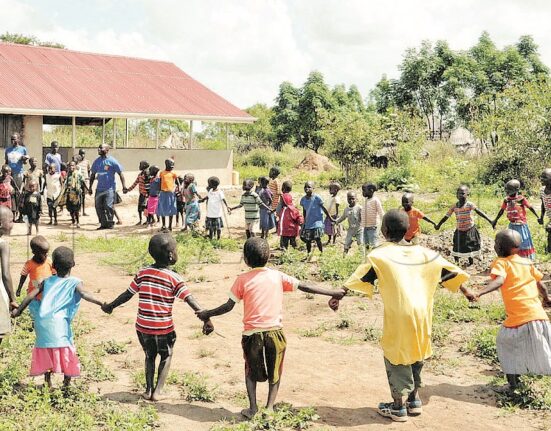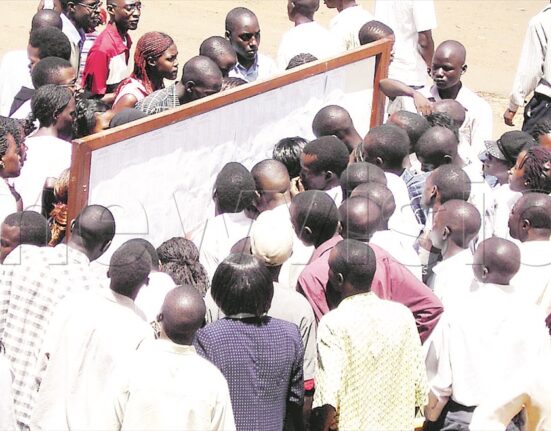(This article was first published in the New Vision on June 8, 2023)
By Andrew Masinde
Evelyn Apalat, a teacher at Nagongera Girls Primary School in Tororo district, has dedicated herself to empowering girls.
She teaches them life skills such as baking, gardening, general hygiene management and counselling, among others.
Apalat started her teaching career in 2006 at Abubakari Primary School, where she taught in Primary Five.
“I allowed my learners to ask questions, listened to their answers and corrected the wrong ones gently,” she says.
In addition, Apalat says, she divided her pupils into groups, encouraging peer-to-peer learning.
She was in charge of education tours and would take the learners to Kampala for school trips.
In 2009, Apalat moved to St James Boys’ Boarding Primary School in Tororo district, where she taught social studies.
The school had idle land which she utilised by setting up a vegetable garden.
“The administration bought the seed, while the pupils planted and weeded the gardens during weekends. They grew various vegetables that supplemented their diet. The surplus would be sold to the community and the proceeds used to buy scholastic materials for the school’s vulnerable pupils,” Apalat says.
The pupils also grew cassava and sweet potatoes, as well as rearing chicken which they would eat over the weekend.
James Opolot, a parent, says Apalat empowered pupils with agricultural skills.
“Many parents initially thought their children were being mistreated, until they realised they enjoyed the agricultural sessions and ate the fruit of their labour,” he says.
In 2010, Apalat was posted to Osia Primary School, also in Tororo district, on the government payroll. She was assigned to teach Primary Seven.
Apalat was later appointed the acting deputy headteacher and headed the English language department.
One challenge she faced at the school was pupil absenteeism, especially in the afternoons.
“Pupils would walk home for lunch and in many cases, never returned for afternoon lessons.”
To mitigate this, with the headteacher’s permission, Apalat introduced maize growing. The headteacher provided the seed that the pupils planted.
“For the first time, the school provided porridge to learners in the lower classes and posho for those in upper classes. Teachers too started eating at school. Previously, they would go to their homes for lunch and some would not return,” Apalat says.
The meals helped to stop pupil and teacher absenteeism and the performance improved drastically.
The school had been allocated funds under the Northern Uganda Social Action Fund II (NUSAF II) to construct staff houses, but this had not been done.
“I reported the matter to the office of the Inspector General of Government in Tororo and eventually the staff housing that accommodates four was constructed,” she says.
Apalat also introduced monthly tests for Primary Seven pupils to improve their performance.
“I paid for the tests initially, but when they started yielding results, parents started contributing,” she says.
The community had high rates of child marriages and teenage pregnancy that led to girls dropping out of school. To turn the tide, Apalat would make home visits, where she sensitised parents to allow pregnant girls and those who had given birth to return to school.

In 2019, she was posted to Nagongera Girls Primary School as a classroom teacher. The headteacher assigned her to head the music department. She mobilised the learners to join different clubs, so they started competing in music dance and drama.
Apalat was also assigned to head physical education, as well as taking care of the pupils’ and staff welfare. Using this position, she advises fellow teachers to upgrade, work wholeheartedly, support vulnerable children, be role models and work as a team for excellent results.
“I introduced vegetable growing in the school for the pupils and teachers to have a balanced diet. In addition, we planted bananas and cassava that the school would eat over the weekend.”
Immaculate Athieno, a pupil, says vegetable growing has enabled them enjoy a balanced diet.
“I started a vegetable garden at home and would sell the surplus to buy scholastic materials and other basic needs at home,” she says.
Apalat is also the senior woman teacher and she offers guidance and counselling to girls on how to handle themselves during their menstruation, guard against early marriages and pregnancies. The girls are also taught other skills such as general hygiene and she also offers career guidance.
Apalat introduced home economics lessons, where learners bake bread, cakes and doughnuts, which are eaten at the school.
“These skills will help the learners even when they are out of school,” she says.
Apalat also helps vulnerable girls to make reusable sanitary pads.
“Our school received a sewing machine from Global Fund, a non-governmental organisation. I use the machine to train the learners in tailoring skills,” she says.
Ann Kabatooro, a pupil, says Apalat mobilises them into groups where they are trained in life skills.
“She teaches us to be responsible; to wait until after school to have sex and not to accept gifts from strangers, among others. All these have motivated us to stay in school,” she says.
Sr Laetitia Acheng, the headteacher, says Apalat is a very active and innovative teacher. She introduced agriculture that has helped the school provide nutritious meals to the pupils and teachers.
“She advises girls to keep in school. She prepares the girls from when they are nine years old about periods and menstrual hygiene,” she says.
“Albert Odi, the district education officer for Tororo district, describes Apalat as hardworking and resilient.
“She willingly takes on responsibilities assigned to her. Before she was posted to Nagongera Girls, she was a deputy headteacher and now is a classroom teacher teaching lower classes, but she did not complain,” Odi says.
Apalat is a team player who works well with the learners and staff, says Peter Omuse, the chairperson of Parent-Teacher Association. He adds that she has taught the learners good manners.
“She teaches them how to lay their beds, cook and general hygiene,” Omuse says.
Her heart beats for vulnerable learners, according to the chairperson of the school management committee, Mathias Ameikere. “She introduced vegetable growing with the surplus sold to buy pads given to girls who are from poor families. As management, we laud her for innovations,” he says.
Apalat also teaches the girls to be assertive.
Covid-19 Interventions
During the first lockdown, Apalat says, she used to visit her learners at home and take them study materials. She offered counselling to those who came to her home and made phone calls to the learners who were far away.
During the second lockdown, the school offered online lessons, which she was in charge of. Apalat taught Primary Six and Primary Two.
She says the children would attend and ask questions. Apalat adds that she ensured that the learners would get exercises and have regular tests.
Co-Curricular
Apalat is also in charge of games and sports. She organises inter-house and inter-school competitions. “Sports is good for the child’s mind, body and career,” she emphasises. This year, Nagongera Girls was the best in inter-school competitions and produced the best participants at the district and national competitions that took place in Mbale.
Background
Born in 1986 in Tororo district, Apalat joined Merikit Primary School in Tororo district and sat Primary Leaving Examinations in 1999. She proceeded to Tororo Progressive Academy for O’level.
In 2003, she joined Nyondo Primary Teachers’ College in Mbale, where she attained a Grade III certificate 2006.
She attained a diploma from Busitema University and she is now pursuing a bachelor’s degree at the same institution.
Apalat dropped out of school in Primary Five in 1997 because her parents could not afford tuition.
“Luckily, I was identified by the local leaders who recommended me for a scholarship from Plan International Uganda. I was granted the scholarship with my entire education paid for,” she says.









Leave feedback about this